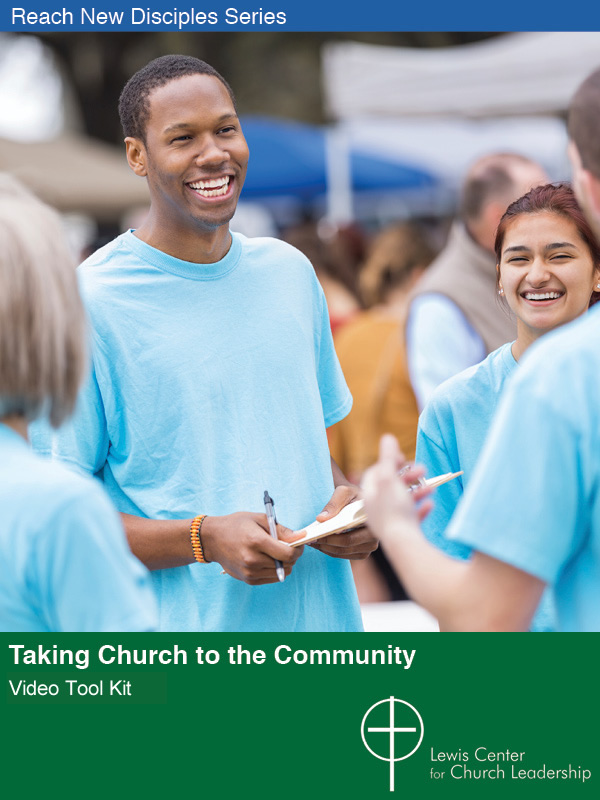Lewis Center Director Doug Powe says special efforts to welcome visitors at Easter shouldn’t be set aside once the holiday is over. He outlines four ways the hospitality of the Easter season can be the launching pad for more intentional visitor welcome throughout the year.
In many churches, Christmas, Easter, and Mother’s Day are the three times of year when a significant number of people who don’t normally attend weekly services are present. And churches typically are well prepared for visitors during these special times. But what if we didn’t reserve our hospitality A-game just for these special days? What if the special efforts planned for Easter became the standard for hospitality each and every Sunday?
Let me share four ways the hospitality efforts of the Easter season can be a launching pad to a more welcoming presence throughout the year.
1. Give extra attention to church appearance.
Almost every congregation gives extra attention at Easter to make sure their church looks special. The church is clean, shiny, and beautifully adorned with flowers. Once Easter is over, we too often fall back into bad habits. And the next time we think about making the church look really nice is Advent.
But what if keeping the church clean and attractive was a year-round priority? What if the church looked its best every time a visitor came? We adorn our churches with signs of resurrection at Easter and with decorations and displays. What if we paid similar attention to telling the gospel story throughout the year with appropriate art and décor to match the season?
2. Display a warm, welcoming spirit.
Typically, when visitors attend an Easter service, they are greeted with a welcoming, joyful spirit. People are in a festive holiday mood, and it shows in how they interact with visitors. But if a visitor returns a few weeks later, that welcoming, joyful spirit usually has been replaced by a half-hearted smile and scant recognition of the visitor’s presence.
Holidays are festive times. And that’s great! But we need to maintain that warm, welcoming spirit throughout the year. If we don’t sustain this welcoming presence, it signals to visitors that our Easter welcome was just a phony front. Christian tradition maintains that every Sunday is “a little Easter.” We need to sustain the enthusiasm and joy of our holidays so that weekly visitors experience the same welcoming spirit they encounter on special days.
3. Keep the message accessible.
Many pastors put a lot of time into the Easter message. The goal is to share the gospel in a way that connects with those not as familiar with church but also impacts those who come weekly. This is a tough task! Once Easter is over, many pastors utter a big sigh of relief. They feel they can return to business as usual, which means only having to connect with those regularly in the pews. It’s much easier to preach to the choir!
But preaching what is essentially an inside message on a weekly basis makes our worship inaccessible and unwelcoming. You never know when a visitor might show up. The sermon is not the sole factor determining if they will return, but an insider message makes it less likely. Pastors need to prepare each Sunday’s message as if it were Easter, addressing multiple audiences and finding ways to include those we hope will show up.
4. Follow up consistently.
Many congregations put extra effort into Easter visitor follow-up. Some even buy special cards for connecting with others during Lent and on Easter. But once Easter is over, too many fall back into a pattern of follow-up that is haphazard at best. A visitor who returns after Easter may not receive any sort of acknowledgement or welcome from the congregation.
Congregations need a system in place to follow up with visitors consistently throughout the year like, for example, having something that is sent to every first-time visitor and something different for second-time visitors. The key is to make sure you have that system in place and not just follow up after Easter.
Most of us look forward to the Easter season. And we do a great job of getting prepared for those who do not normally come. But let’s not put all our eggs in this one basket! Instead, make your efforts at Easter the launching pad for more intentional hospitality throughout the year.
This material is adapted from 4 Ways to Make Christmas Eve Hospitality the Pattern for the Year published December 4, 2019.
Related Resources
- Be the Welcoming Church, a Lewis Center video tool kit resource
- The Tully Principle of 52 Equal Sundays by Lovett H. Weems Jr.
- Why Limit the Celebration of Easter to Just One Sunday by David W. Manner
- 50 Ways to Welcome New People, a free resource from the Lewis Center
If you would like to share this article in your newsletter or other publication, please review our reprint guidelines.







